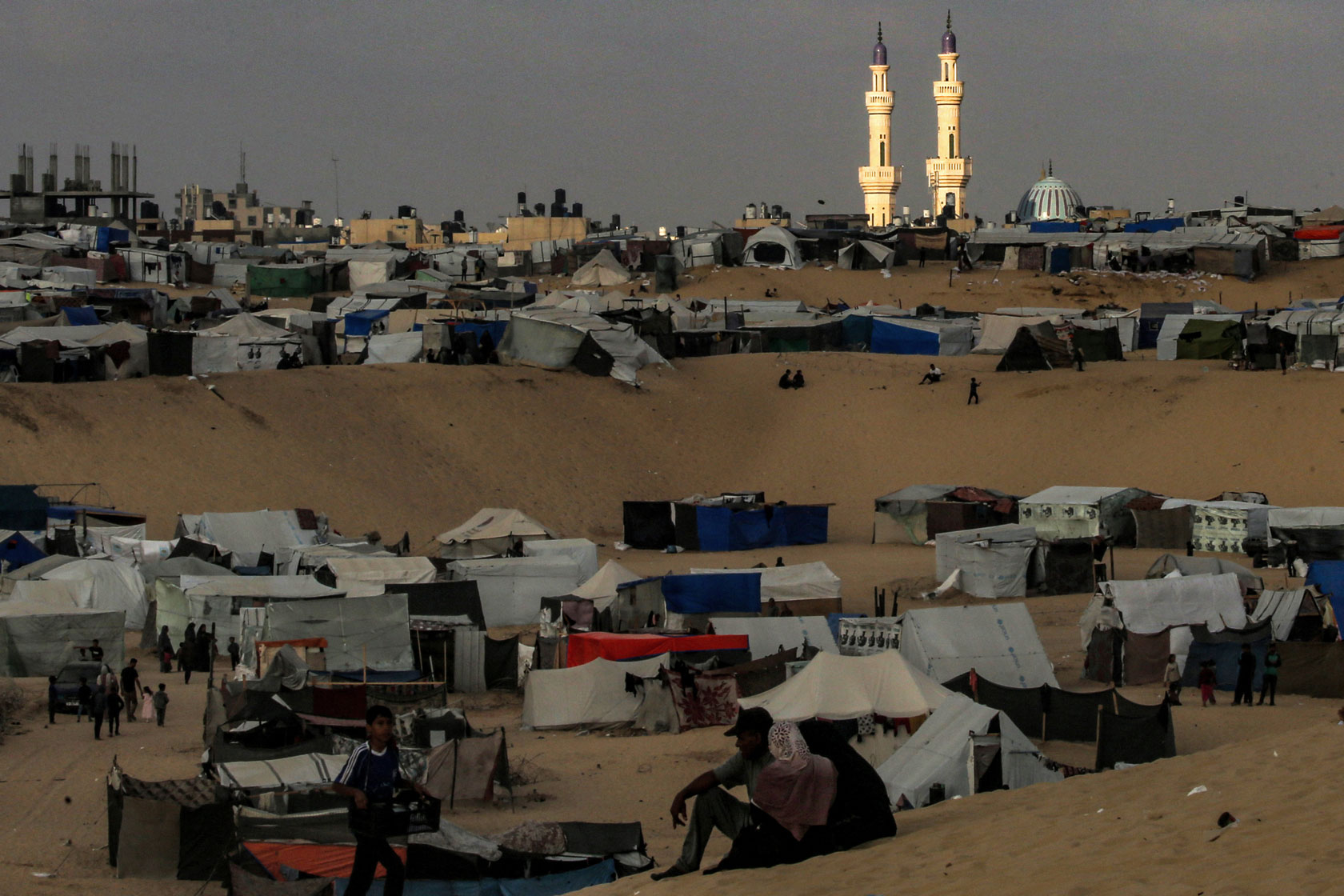Principles and Positions on Israel and Palestine (original) (raw)
Media Contact
Government Affairs

Tents of displaced Palestinians are seen at a camp in Rafah in the southern Gaza Strip on April 30, 2024. (Getty/AFP)
For decades, Israelis and Palestinians have endured cycles of violence that have wrought exceptional suffering. This violence is tied to a seemingly intractable political and security situation made worse by corrupt, stubborn leaders who have privileged short-term gains over long-term peace. Time and again, violence, corruption, and a failure of political vision have overwhelmed the best efforts of world leaders (including—and often—at the highest levels of U.S. leadership) over decades of mistrials.
While innocents suffer, these failures rest at the feet of leaders on all sides of this conflict. Israel has systematically deprived the rights of Palestinians in the occupied territories and within its own borders, and the Israeli government has sought to eliminate support for displaced Palestinians outside of them. At the same time, a variety of state and nonstate actors have vowed to destroy Israel’s very existence—and some of these, including the Iranian-backed terrorist organizations Hamas and Hezbollah, have engaged in regular acts of violence against Israelis.
It is against this backdrop that Hamas carried out the most horrific atrocities against Israelis in history. Hamas massacred some 1,200 people on October 7—including women, children, and the elderly—and captured 260 hostages, many of whom have perished in custody. Since then, Israel has carried out one of the most brutal military offensives in the last century, killing over 34,000 Palestinians, more than two-thirds of whom are women and children. Israel has blockaded food, fuel, and medical assistance; destroyed Gaza’s hospitals; and directly created the conditions for famine to take hold.
While this conflict may seem intractable, it need not be. The United States especially has a critical role to play. As the leading guarantor of Israeli security, the United States has sent more than $100 billion in military aid since Israel was founded, investing in a privileged relationship based on principles of security and democracy. This relationship obligates the United States to more boldly use its influence to protect these principles today.
The moment is urgent. Famine has already begun in Gaza—a drastic deterioration in food security over the past six months—and will worsen without immediate relief efforts. The region remains on the precipice of conflict after months of violence in Gaza and acts of Iranian and Israeli aggression across borders. In the wake of Hamas’ brutal October 7 attacks; amid Israel’s ongoing and indiscriminate military offensive, including continued commitment to advance troops in Rafah; and in the face of increasing risk of wider conflict in the region, the United States must use its leverage to resolve these interconnected political, security, and humanitarian crises.
This crisis requires that U.S. policymakers:
- Strengthen American political and diplomatic leadership in the region
- Uphold U.S. and international law in our support to Israel and the region
- Leverage American power to ensure the full rights and security of the Palestinian people
- Set transparent goals
- Prioritize the protection of civilians and human rights in our interventions
- Orient our engagement towards long term political solutions to end occupation and deliver security and peace
These actions must be grounded in a set of principles that include:
- Respecting international law
- Protecting human security for Israelis and Palestinians alike
- Recognizing the need for justice and remedy for wrongs
- Centering self-determination as critical to a just peace
- Demanding that government actors are accountable to their people
- Taking a firm stance against discrimination and hatred in all forms
These principles are both urgent and enduring. They are intended to provide a foundation for continued efforts to secure a durable end to the current conflict as well as to offer a broad framework for U.S. policymakers as they advance plans to deliver peace and security to Israelis, Palestinians, and the wider region.
International law: All parties in the conflict—including weapons providers such as the United States—have responsibilities under international law and should be accountable for violations.
- State and nonstate actors alike have obligations under international humanitarian law and the laws of armed conflict, which prohibit hostage-taking, the targeting of civilians, obstruction of humanitarian relief, sexual violence as a weapon of war, and other forms of inhumane or degrading treatment.
- CAP position: Hamas’ brutal attacks on October 7, as well as their continued detention and ill treatment of hostages, represent grave violations of the laws of armed conflict.
- CAP position: Israel’s indiscriminate bombardment of civilians and civilian infrastructure, as well as the obstruction of aid and targeting of aid workers and medical infrastructure, represent grave violations of international humanitarian law and the laws of armed conflict.
- The United States has a responsibility to ensure it does not abet war crimes or gross human rights violations.
- CAP position: The United States should abide by international law, U.S. law, and U.S. policy in the sale and transfer of weapons to Israel. These must be subject to appropriate monitoring and accountability mechanisms, including congressional notifications.
- CAP position: Given the preponderance of evidence that Israel has engaged in violations of international humanitarian law and the laws of armed conflict, the United States has an obligation to suspend transfer of lethal weapons to Israel until the threat of famine has passed and Israel has demonstrated a serious commitment to civilian protection.
- CAP position: Continued arms transfers to Israel violate section 620I of the Foreign Assistance Act and contravene the guidelines established in the Conventional Arms Transfer policy and the NSM-20.
- Since 1967, Israel has occupied the Palestinian territories of Gaza and the West Bank, including East Jerusalem.
- CAP position: This occupation is illegal under international law and per U.N. Security Council resolutions, as are the continued expansion of settlements, forced displacement, dispossession of Palestinian land, and the blockade of Gaza that has occurred under this occupation.
- CAP position: President Biden’s executive order authorizing sanctions against those who are responsible for or complicit in the illegal expansion of settlements is a welcome step to accountability for illegal settlement expansion. The administration must apply these sanctions to all those responsible—in policy as well as illegal action—to curtail the continued illegal activity and increase in violence in the West Bank over the past six months.
- We recall the legacy of the war on terror, where allegations of terrorism were used to justify rights violations and facilitate unlawful killing, arbitrary detention, enforced disappearance, and other abusive activity.
- CAP position: We strongly support efforts to bring Hamas perpetrators to justice, but justice must be conducted in line with international law and standards on countering terrorism, and any actions that may occur in the name of countering terror must adhere to the principles of necessity and proportionality.
- CAP position: Israel’s widespread arbitrary detention of Palestinians and a reliance on administrative detention amount to collective punishment and abuse of rights. All prisoners have the right to a fair and speedy trial, and Israel must either grant these rights or release prisoners immediately.
- CAP position: The use of torture is never acceptable under any circumstances. Israel must investigate thoroughly any allegations of torture in detention and hold perpetrators responsible. The United States must assess whether torture in Israeli detention facilities rises to a systematic level and demand accountability as appropriate.
Human security: All individuals have the right to safety from common threats including hunger, disease, repression, as well as the right to protection during armed conflict, disasters, and other disruptions to peace.
- The humanitarian situation in Gaza is desperate; nearly all of the population has been displaced and are without regular access to safe water, food, fuel, medical supplies, and electricity. Famine has begun in parts of Gaza and threatens to worsen without immediate relief efforts.
- CAP position: We reiterate our call for an immediate, sustained ceasefire negotiated between Hamas and Israel to allow critical aid to enter Gaza and to facilitate the release of Israelis being held hostage.
- The humanitarian situation in the West Bank has also declined over the past months, as Israel has carried out heavy-handed security operations and settler violence has increased.
- CAP position: We call for an end to settler violence, accountability for unlawful security operations or acts of violence, and respect of Palestinian rights in the West Bank.
- Decades of Israel’s illegal occupation and Hamas’ corrupt governance created a humanitarian situation in Gaza that was already acute prior to the current conflict. More than 80 percent of Gazans relied on humanitarian aid prior to this conflict.
- CAP position: Assistance in addressing immediate, medium-, and long-term needs of Palestinians must be a key component in any long-term political solution. The international community, including the United States, must be prepared to invest in relief, recovery, and reconstruction in Gaza, including by continuing to fund the U.N. Relief and Works Agency.
- Israelis, as well as all the region’s people, deserve to live in peace and security, free from the threat of assault from Iran and its proxies.
- CAP position: Both Iranian and Israeli actions in the region have escalated the risk of regional conflict, which threatens Israelis and the people of the region. The United States must continue to set clear expectations—to Israel and Iran alike—that further escalatory action will not be tolerated.
Justice: Perpetrators of violent and illegal acts must be brought to justice under the law; states and nonstate actors are accountable to processes of justice; and victims’ remedies must be centered in these processes.
- Acts of violence against civilian populations that create an atmosphere of terror to advance political aims qualify as acts of terrorism: Hamas’ October 7 attacks were acts of terrorism.
- CAP position: Israel and the international community must prioritize bringing perpetrators to justice under the law, whether through trials or under the international laws of armed conflict, where perpetrators continue to act as combatants.
- Combating Hamas will require international efforts to financially isolate the organization and degrade its ability to acquire weapons.
- CAP position: We welcome sanctions that target funding for Hamas and call for continued application of sanctions against those involved in perpetrating or funding Hamas’ terror acts. These efforts to isolate Hamas funding must be supported in a global coalition of partners.
- CAP position: Iranian support for Hamas fundamentally enabled the October 7 attacks, although there is no evidence that Iran directed them. Iran must commit to ending its support for Hamas, and the United States must work through international partners to ensure this commitment.
- Since October 7, Israelis and Palestinians have been victims of violence and gross violations of human rights. These violations have caused deep loss, suffering, and trauma in Israeli and Palestinian communities.
- CAP position: Rights violations perpetrated by any actor require remedy, and we recognize the pressing need for a period of transitional justice for these abuses.
Self-determination: All peoples are entitled to determine a sovereign government of their choosing, with equal rights and access for all to participate in this determination.
- Diplomacy and efforts to determine a two-state solution, in which Palestinians and Israelis live in separate states, have failed for decades and led to disillusionment among all parties. Yet, the two-state solution provides a necessary framework to advance long-stalled Palestinian self-determination.
- CAP position: We reject in the strongest possible terms any plans for Israel to reoccupy Gaza at the end of this period of conflict.
- CAP position: Ultimately, Israelis and Palestinians must negotiate the terms of statehood, including the status of land under Israeli occupation, the right of return for Palestinians, and the status of East Jerusalem.
- CAP position: Any two-state solution should be oriented toward the outcome of Palestinian self-determination, rather than a process without end. The United States must orient its influence and leverage toward creating the conditions for time-bound negotiations to take place in earnest.
- CAP position: Negotiations on Palestinian statehood must not preclude the immediate necessity of equal rights for all Palestinians, whether in Israel or the occupied territories.
- Both Israeli and Palestinian negotiators have borne responsibility for the failure to reach negotiations on a two-state solution, and international partners have increasingly sought other avenues for achieving peace (such as the failed “deal of the century” and other normalization agreements).
- CAP position: The United States is right to recommit to finding a political solution that delivers equality, rights, and peace to Israelis and Palestinians. U.S. policymakers must be explicit about centering Palestinian statehood in a policy vision for regional peace and seek normalization based on this vision—not the other way around.
- CAP position: As Israel’s closest ally, the United States should demand an end to Israel’s settlement expansions and rights abuses, which have undermined progress toward a political solution. These actions cannot wait for the conclusion of negotiations on Palestinian statehood but must take place immediately.
- CAP position: The United States must remain engaged with Palestinian political leaders, Arab partners in government, and Palestinian civil society to ensure Palestinian commitment to achieving a negotiated settlement.
Democratic accountability: All governments have obligations to protect rights, ensure welfare, and respond to the will of their people.
- Palestinian governance—under the Palestinian Authority or under Hamas—has been plagued by corruption, illiberalism, and erosion of democratic institutions and the rule of law.
- CAP position: Palestinians must be able to freely choose their governments and international partners must demand accountability for undemocratic activities. The United States must commit to supporting free elections, ideally in a new state of Palestine, but also in any future governance model.
- Prime Minister Benjamin Netanyahu is the primary responsible party for the indiscriminate military offensive in Gaza and has long been an outspoken opponent of Palestinian statehood. Netanyahu’s right-wing coalition government has sought to expand Israeli control across all of the Palestinian territories.
- CAP position: Netanyahu and the extremist members of the Knesset in his coalition are obstacles to peace and security in the region. The Israeli government must listen to its people’s demands and organize elections so that Israeli citizens may elect a government of their choosing.
- Often touted as the region’s “only democracy,” Israel has experienced serious democratic backsliding in recent years under the right-wing government of Netanyahu.
- CAP position: The United States must stand against any attempts to centralize power or undermine the country’s judiciary.
- As Israel’s greatest ally and its primary security assistance partner, the United States has created an exceptional policy framework to facilitate delivery of arms or training that are not subject to standard rigorous monitoring or standards on rights and accountability the United States requires of other governments.
- CAP position: We call for the U.S.-Israel security relationship to adhere to the same compliance with existing policies on rights and accountability as any other security partner worldwide.
Antidiscrimination: All people have the right to express and experience their identities equally, without fear of violence or discrimination on the basis of their race, religion, or ethnicity.
- We recognize the histories of marginalization and violence experienced by Jews, Muslims, and Arabs worldwide.
- CAP position: We stand against antisemitism and Islamophobia in all forms.
- We see rising antisemitism and Islamophobia as growing concerns in the United States and other Western countries.
- CAP position: We demand full accountability under the law for any hate speech or hate crimes committed against Jews, Muslims, or Arabs in the United States and elsewhere.
- The conflict has seen an outpouring of response, often emotionally charged; at the same time, many have faced sanction for their free expression.
- CAP position: We support the rights to free expression and assembly, so long as these do not amount to hate speech. We recognize the feelings of fear and vulnerability that so many communities feel and we stand in solidarity with them.
Conclusion
The United States has a critical role to play in advancing peace and security in the Middle East, and this role must be grounded in the dignity and self-determination of Israelis and Palestinians as well as governed by the rule of law. In taking strong, principled positions, the United States can lead with credibility to address this seemingly intractable conflict.
This much we know to be true: All the people of the region deserve peace and security—and no matter the immediate needs on the ground—we cannot lose sight of that greater goal.
The positions of American Progress, and our policy experts, are independent, and the findings and conclusions presented are those of American Progress alone. A full list of supporters is available here. American Progress would like to acknowledge the many generous supporters who make our work possible.

Patrick Gaspard
President and Chief Executive Officer, Center for American Progress

Allison McManus
Managing Director, National Security and International Policy